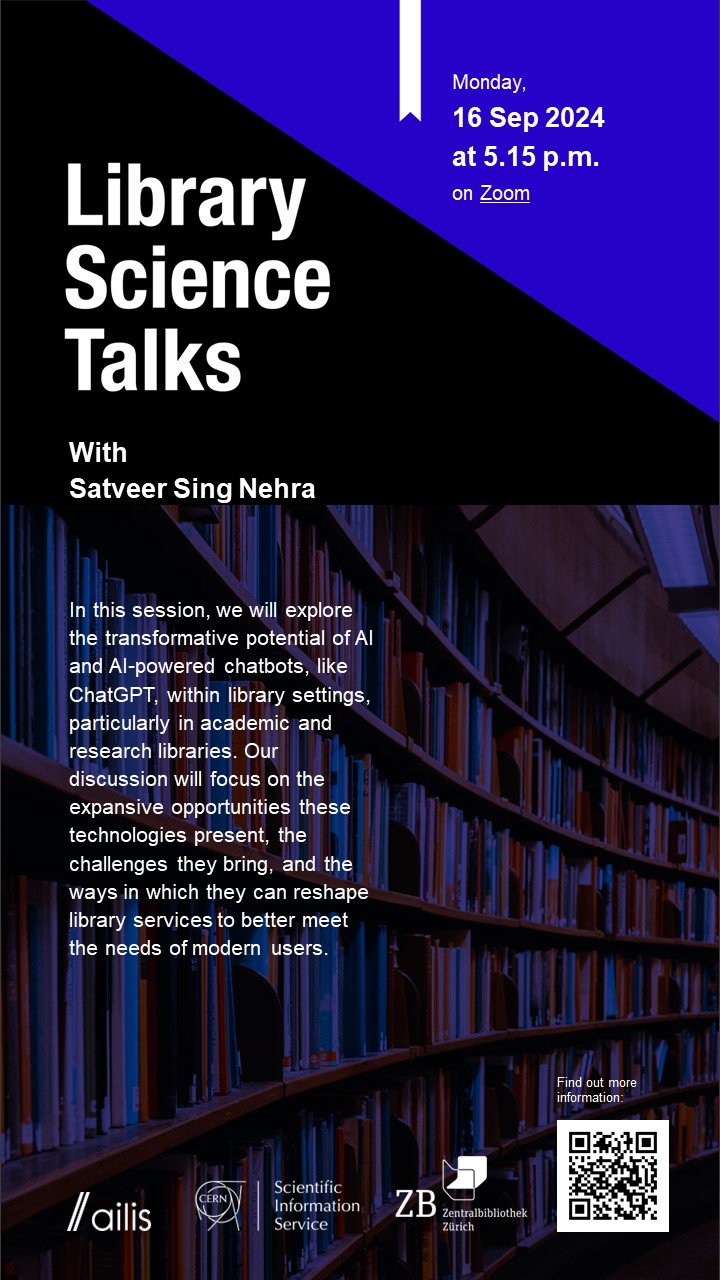Library Science Talk - Artificial Intelligence and Academic Libraries
by
This Talk will take place in English exclusively on Zoom. Registration is not required to attend.
Please connect to the following link on the day of the event: https://cern.zoom.us/j/66221719797?pwd=RkZOYjZIQmU0VnArNzBtRzRMamdjZz09
Abstract: Artificial Intelligence and Academic Libraries
In this session, we will explore the transformative potential of AI and AI-powered chatbots, like ChatGPT, within library settings, particularly in academic and research libraries. Our discussion will focus on the expansive opportunities these technologies present, the challenges they bring, and the ways in which they can reshape library services to better meet the needs of modern users.
The most significant way in which AI-powered chatbots can benefit academic libraries is by promoting various services, such as specialised librarianship and reshaping services by thinking outside the box, enabling the search and retrieval of information based on personal recommendations. These advancements raise the standards that libraries offer. While the potential benefits of AI-powered chatbots are substantial, it is essential to acknowledge the challenges that may arise. One significant concern is the risk of user over-reliance on AI. Suppose users become too dependent on chatbots for information. In that case, they may neglect traditional research methods or develop a diminished capacity for critical thinking and decrease in the reading habit of authentic information resources such as books and journals, resulting in not getting high-quality data. AI is going to affect not only the library users but also the library staff, i.e., the lack of skilled staff in underdeveloped nations. AI-powered Chatbots (Like ChatGPT) also face potential biases, ethical implications, and an inability to understand tone or context, leading to misunderstandings and poor communication. To mitigate this risk, libraries must promote a balanced approach, encouraging users to combine the use of AI tools with traditional research techniques. To address this issue, libraries in developed countries can collaborate with their counterparts in developing nations to provide training, support, and access to AI technologies. In addition to these practical challenges, AI-powered chatbots also raise ethical concerns. For example, there is a risk of bias being encoded into these systems, leading to unfair or discriminatory outcomes. To overcome such issues, libraries must be vigilant in monitoring the development and deployment of AI technologies and ensuring that they are used ethically and responsibly.
Some of the challenges discussed are not only applicable to the underdeveloped nations or developing nations but are also applicable to the developed nations too. In order to overcome these challenge librarians needs to change their way of delivering information to the users instead of waiting for the user to approach the libraries, now the time has came for the library professionals to step outside the library and approach the users to fulfil their information demand.
Humans have created AI, and Not AI has created Humans. Hence, Library professionals need to prove that they are teachers of teachers and superior to any technology. Technology can used to support or enhance services and not replace humans.
Speaker: Satveer Sing Nehra from Savitribai Phule Pune University
Mr Nehra graduated and post-graduated in German language and literature, and after that, he did a bachelor's and Master's in Library and Information Science. He is currently pursuing his PhD in Library and Information Science at the esteemed Savitribai Phule Pune University, where his research focuses on the intersection of Open Research Data and Artificial Intelligence. Mr Nehra is a dedicated researcher with a passion for exploring the implications of AI in libraries and the context of open data, a field that is rapidly transforming the way we access and utilise information in the digital age.
Mr. Nehra published several scholarly articles in SCOPUS and Web of Science-indexed journals. His work has appeared in highly respected journals of the field, such as the Journal of Web Librarianship, a Q2 SCOPUS-indexed publication. His research has garnered international attention, as evidenced by his presentation at the IFLA WLIC Conference in the Netherlands in August 2023. Within India, he has presented papers at significant conferences, including CALIBER at Banaras Hindu University and ICEDLP at the DRTC, Indian Statistical Institute.
In August 2023, he was awarded the “IFLA ARL Attendance Grant” by the International Federation of Library Associations and Institutions (IFLA), enabling him to deliver a thought-provoking talk on the implications of AI at the World Library and Information Congress (WLIC) in the Netherlands. Additionally, Mr. Nehra was the recipient of an SLA Hardship and a “Commonwealth of Learning” scholarship, awarded by the Canadian Government in collaboration with Google, to pursue an advanced course in data analytics.
Beyond his research, Mr. Nehra is also a dedicated educator. Since July 2022, he has been imparting knowledge and shaping the minds of future information professionals at the Department of Library and Information Science, Savitribai Phule Pune University. He teaches a comprehensive 4-credit course to MLISc students and has expertly delivered various foundational courses, including Library and Information Science, Information Technology, reference sources and services and Management in Libraries. His teaching is characterised by a deep understanding of both theoretical and practical aspects of the field, ensuring that his students are well-equipped to navigate the challenges of the modern information landscape.
In addition to his academic and teaching pursuits, Mr. Nehra plays an active role in the global library and information science community. He is a member of the IFLA SIG Big Data Committee, where he collaborates with global experts on important issues related to big data. Mr. Nehra also serves as the Assistant Editor of the IFLA Newsletter, contributing to the dissemination of knowledge and best practices across the profession.
The Zentralbibliothek Zurich, the CERN Scientific Information Service, and AILIS (Association of International Librarians and Information Specialists, Geneva) jointly organize the Library Science Talks. A programme of talks for 2024 can be found on the AILIS website.

Zentralbibliothek Zurich, CERN Library, AILIS (Association of International Librarians and Information Specialists, Geneva)